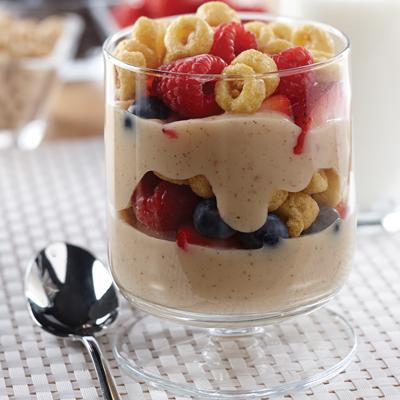Ingredients
-
1/4 cup - sugar
-
2 tablespoons - cornstarch
-
2 cups - fat free milk
-
2 egg yolks, lightly beaten
-
2 tablespoons - almond butter
-
2 teaspoons - vanilla extract
-
Mixed fresh berries for serving
-
Crunchy cereal for serving
Preparation
-
Whisk sugar and cornstarch in a medium saucepan until well blended. Slowly drizzle in milk, whisking until smooth, then whisk in eggs.
-
Cook pudding over medium heat until it begins to thicken, whisking often. Reduce heat to medium-low and, stir pudding with spatula, scraping the sides and bottom of pot until thickened.
-
Off heat, whisk in almond butter and vanilla. Transfer pudding to a bowl, cover with plastic wrap, pressing to the surface to prevent skin from forming, and chill for at least 2 hours.
-
Spoon 1/3 cup of chilled pudding into four parfait glasses. Top with some berries and 2 tablespoons cereal, then layer another 1/3 cup pudding on top, followed by more berries and cereal.
Serves
4 servings
Family Features) Today, 85 percent of Americans fall short of the USDA's recommended daily servings of lowfat or fat free milk - a staggering number when you take into account milk is the top food source for three out of the four "nutrients of concern" - the nutrients that Americans are most lacking, including calcium, potassium and vitamin D.1 Each 8-oz glass has nine essential nutrients including eight grams of high-quality protein- that's more than an egg. Milk also has B vitamins for energy, vitamin A for a healthy immune system and bone-building nutrients, including calcium and vitamin D.
Incorporating milk into your morning meal is an easy way to help close the gap between actual and recommended milk intake. Is fat free milk your milk of choice? Here are five things you may not know about skim or fat free milk:
-
Counting calories? One 8-oz. glass of fat free milk has just 80 calories (with the same 9-nutrient power).
-
Milk drinkers tend to be leaner than non-milk drinkers.2,3,4 And, experts recommend including three servings of fat free or lowfat milk each day to help maintain a healthy weight.
-
Drinking fat free milk at breakfast could help stave off lunchtime hunger, according to an Australian study. Researchers found that drinking fat free milk (20 ounces) in the morning helped increase satiety, or a feeling of fullness, and led to decreased calorie intake at the next meal, as compared with a fruit drink. The milk drinkers ate about 50 fewer calories (or nearly 9% less food) at lunch.5
-
Think fat free means fewer nutrients? Think again. Fat free milk has the same 9 essential nutrients as lowfat, reduced fat, or whole milk - just with fewer calories.
-
Not all "milks" are created equal. Many of the alternative beverages just can't provide what you would get in a glass of fat free dairy milk. For example, while an 8-oz glass of vanilla almond "milk" has about the same calories, it contains only 1 gram of protein, compared to fat free milk's 8 grams of high-quality protein.
See how delicious fat free milk can be with this easy and impressive breakfast recipe that includes fat free milk to start your day off right. For more fresh recipes using fat free milk, visit MilkLife.com.
-
U.S. Department of Agriculture and U.S. Department of Health and Human Services. Dietary Guidelines for Americans, 2010. 7th Edition, Washington, DC: U.S. Government Printing Office, December 2010.
-
Murphy M, Douglass J, Johnson R, Spence L. Drinking flavored or plain milk is positively associated with nutrient intake and is not associated with adverse effects on weight status in US children and adolescents. Journal of the American Dietetic Association. 2008;108:631-639.
-
Barba G, Troiano E, Russo P, Venezia A, Siani A. Inverse association between body mass and frequency of milk consumption in children. British Journal of Nutrition. 2005; 93(1):15-19.
-
Murphy K, et al. Dairy Foods and Dairy Protein Consumption Is Inversely Related to Markers of Adiposity in Obese Men and Women. Nutrients. 2013;5:4665-4684.
-
Dove, E, et al. Skim milk compared with a fruit drink acutely reduces appetite and energy intake in overweight men and women. American Journal of Clinical Nutrition. 2009;90:70-75.
